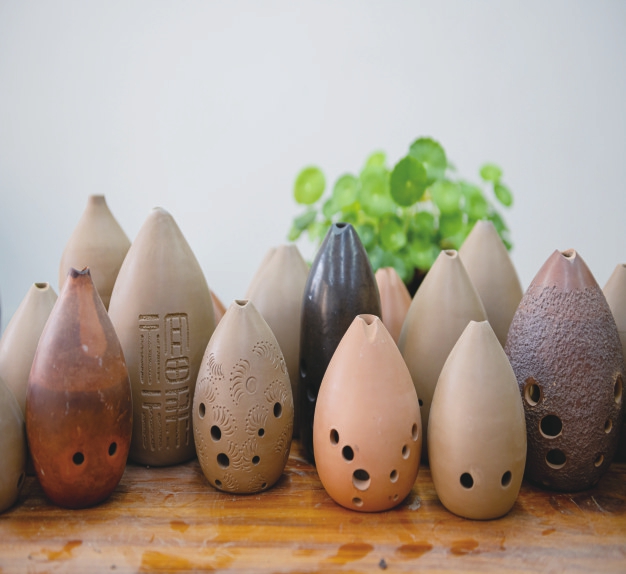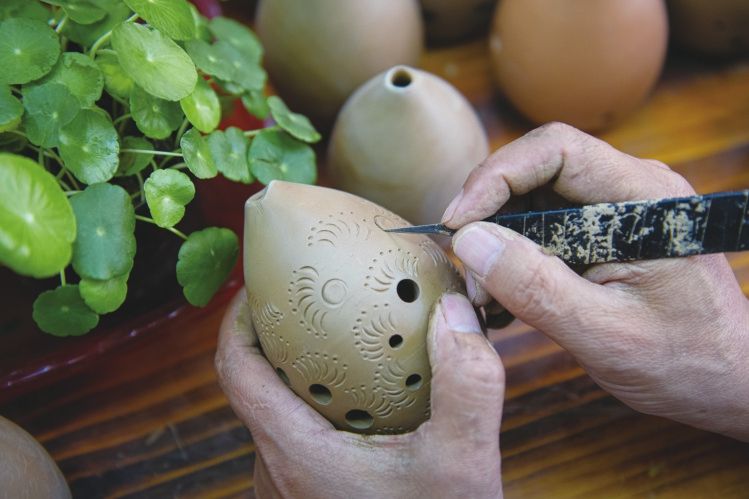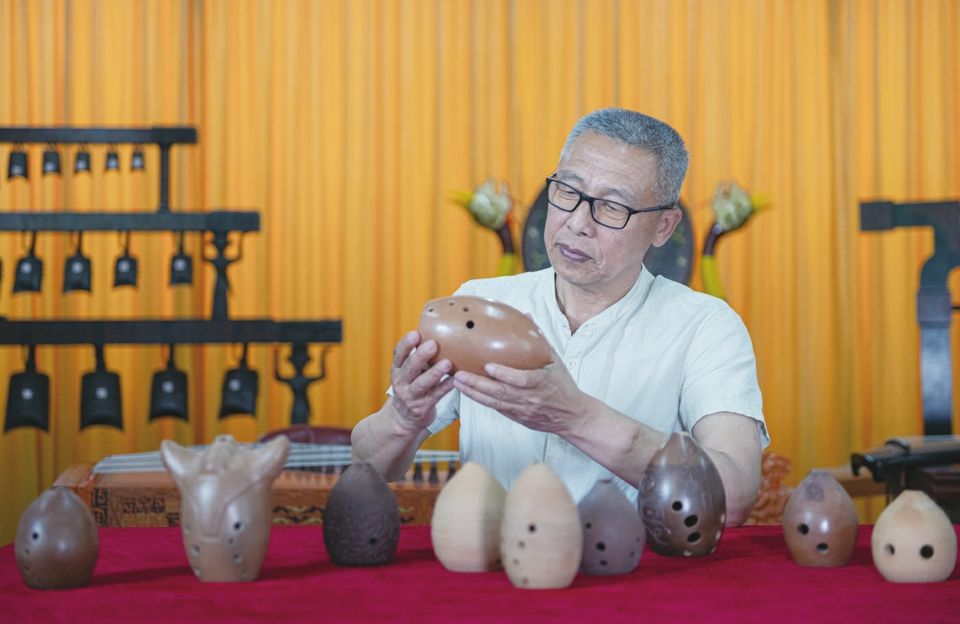Pu Shutang devotes himself to research and inheritance of Tanghu Xun production skills - the sound of Xun conveys the ancient rhythm
Pu Shutang devotes himself to research and inheritance of Tanghu Xun production skills - the sound of Xun conveys the ancient rhythm

Various forms of xun

Carving ancient ornaments on pottery blanks

Pu Shutang checks the condition of Xun
The body is "as big as a goose egg, and as small as a chicken", and the voice is long and lingering, as if weeping and complaining. It is a traditional Chinese musical instrument with a history of 7,000 years - xun.
"The ancient Chinese musical instruments are collectively referred to as 'eight-tone'. They are classified according to different materials. There are eight categories of gold, stone, soil, leather, silk, wood, scorpion, and bamboo. Xun is the 'earth' in the 'eight-tone'." April 25 The reporter met Pu Shutang in Ningjin County Vocational Secondary School on 19th, and when he mentioned Xun, he talked eloquently, "The upper end has a mouthpiece, the bottom is flat, and the side walls have sound holes. As early as the Neolithic Hongshan Culture Period , Xun's performance is very popular, it is simple and humble, unique in nature, and it also occupies an important position in the history of primitive art in the world."
Coincidence takes root in Ningjin
Pu Shutang, 60, is a native of Meihekou City, Jilin Province, and came from a family of pottery artists. He is currently a Distinguished Professor of the School of Music of Texas College and a Professor of Ceramic Design and Production in Ningjin County Vocational Secondary School. "I first came to Dezhou at the invitation of Liang Ziheitao. I came to Ningjin by chance, came into contact with and fell in love with the musical instrument Xun, so I took root in Ningjin and lived there for 15 years." Pu Shutang said.
According to legend, in ancient times, people used to tie a rope to a stone or a mud ball and threw it out to hit birds and beasts. Some stones had naturally formed cavities. Inspired, the ancients made a similar musical instrument "Tao ling bell", and the early Xun took shape. In the Han Dynasty, Xun entered its heyday, and the Western Han Dynasty was able to make seven-hole Xun, which was unique to the supreme and noble royal love. After the Sui and Tang dynasties, the number of people who practiced Xun decreased, and Xun music gradually declined. After the Song Dynasty, civilian music and art began to be active in Goulan Washe, and the quaint Xun gradually faded out of people's sight. It was not until the end of the Qing Dynasty that Wu Xunyuan copied the five-tone Kong Taoxun of the Yin Dynasty, and compiled the only Xun score in China-Tanghu Xun Pu according to the method of guqin reduced-character notation, which revealed the mystery of Xun.
While talking, Pu Shutang took out "Tanghu Xun Score". Wu Xunyuan, courtesy name Tanghu, was from Wangzhuang, Xiaodian Township, Ningjin County. The xun score is painted with xun diagrams, the fingerings are marked, the playing methods are explained, and the music such as "North Parasitic Grass" and "Xinliangzhou Preface" are recorded. "This xun score is of high value for the ancient xun making method, playing method and research on xun score, and it is a rare and precious historical material. I can have such a great interest in xun, to a large extent because of this xun score. spectrum," he said.
Inheriting skills and fascinated by xun
In the production process of pottery xun, it can be roughly divided into three processes: blank-making, firing, and tuning. Among them, blank-making is related to the shaping and tuning of the entire xun body, which is particularly important.
"To make xun, you must first find a good clay, knead and drop it on the slate repeatedly to remove impurities and air bubbles, then pull it into a blank, and then dry the blank until it doesn't stick to your hands, and then you can open the hole and fix the sound. In order to find good clay, I After on-the-spot investigations on both banks of the Lijin River and Tuhai River, the river mud of the Lijin River was finally selected." Pu Shutang said that the river mud of the Lijin River has strong viscosity and good air permeability, which is very suitable for pottery Xun production.
Xun needs to be tuned several times during the production process. After the xun blank is finished, it will enter the stage of punching and initial tuning. Pu Shutang took out the tool and began to punch holes in the xun blank according to the shape of his hand. These tools are made by himself, there are dozens of large and small. "Drill small holes first, then expand a little bit, tune the sound a little bit, and finely polish it with sandpaper, and adjust it at any time according to changes." He said that this is the stage that requires the most effort in the xun-making process, requiring craftsmen to have the First-class musical knowledge and performance level.
The earth fire is born, and the sounds of nature are leisurely. There is also great uncertainty when the dry billet with a good pitch is put into the kiln and fired in the fire. During the firing process, the fire and temperature should be well controlled. After firing for about 10 hours, the temperature should be controlled between 975 and 1050 degrees Celsius. "Clay will shrink during the firing process, and the dry and wet weather will also affect its degree of shrinkage, just like blue-and-white porcelain must wait until it is fired on a rainy day. These subtle differences can only be controlled by very experienced xun makers. "Pu Shutang said regretfully, "It's not bad to have 2 performance levels out of 10. I did a dozen or so a few days ago, but the crack has the best sound quality."
After coming out of the kiln, Tao Xun needs to fine-tune the pitch and sound quality again to make each pitch sound more intense. Finally, after polishing and beautifying, a beautiful musical instrument is completed.
Public welfare teaching promotes Chinese music
"I have walked bridges in many places, seen clouds many times, and drank many kinds of wine, but I have only loved a person of the best age." Shen Congwen's "Xiangxing Sanji" is often used in this sentence. To express love between men and women, for Pu Shutang, it is also appropriate to describe his love and nostalgia for Chinese music, "The traditional Chinese music has a unique tone, expressiveness and style, which reflects our national spirit and The rich connotation of national culture can arouse the empathy experience of the audience.”
With this emotion, he and his wife Lang Aikun decided to spend more than 100 days each year to carry out public welfare teaching. Tanghu Primary School became their "good field for sowing seeds".
Tanghu Primary School has been featuring Taoxun since its establishment. The school has two music classes a week, one of which is for the fifth and sixth grade students to learn Taoxun performance and production, and the first to fourth grade students to learn the six-hole ocarina and the twelve-hole ocarina, laying the foundation for the future study of Taoxun. "I gave the Taoxun I made to the children for free, so that they could learn, play, and feel the beauty of music." Pu Shutang said, in addition to Taoxun, he also gave this group of children ocarinas, pottery drums, etc. Help them form an ancient pottery band. At the end of last year, Tanghu Primary School received an invitation letter from CCTV's "Chinese Rites and Music" Spring Festival Gala program group to show their performance of "Su Wu Shepherd" to the national audience.
"From the moment children come into contact with them, they will like them for a lifetime, and they will go to promote Chinese music." Pu Shutang said that now more and more people have come into contact with and like these pottery musical instruments, and he hopes that more and more The intangible cultural heritage projects of the company have entered the campus, allowing more people to feel the charm of ancient xun and even traditional Chinese music, and do their bit for the promotion and inheritance of excellent traditional culture.
 渝公网安备 50010702504639号
渝公网安备 50010702504639号